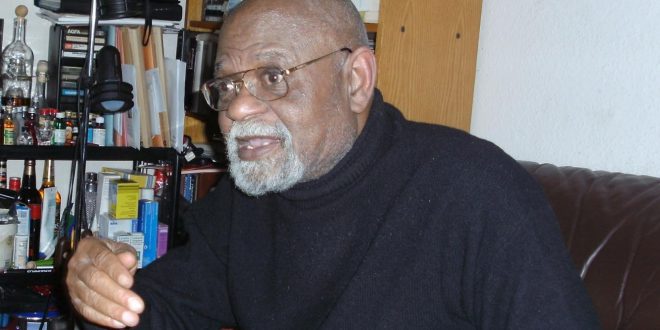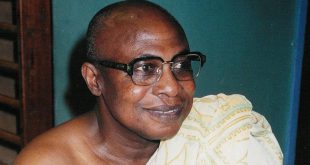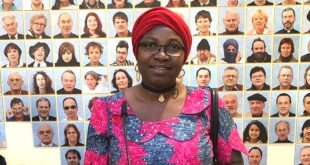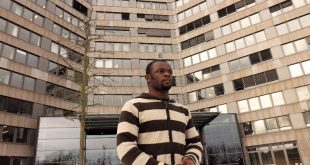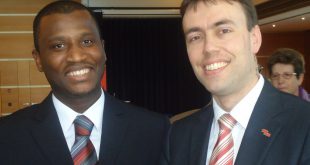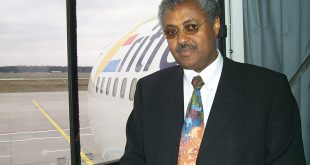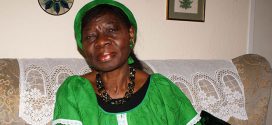Adebisi Laja, born in 1932, first arrived in Europe in June 1954, when he disembarked a ship that took him from his native Lagos to Liverpool. In October 1958, he moved to Germany to study medicine. The old, but still very energetic man, talks about life in Europe and Germany then and now; he reveals how he deals with the problem of racism and gives useful tips on how to survive and thrive in Europe. Dr Laja also explains why he spends his retirement in a small, tranquil western German town of Lindenfels rather than in his native land.
The African Courier: When did you first come to Germany?
Dr Laja: I came to Germany in October 1958 from England.
How long did you stay in England?
I lived in England for four years. Actually, I left Nigeria in June 1954.
Why did you leave Nigeria?
At that time, we had only one university, the one in Ibadan. And there’re only five secondary schools in Lagos with so many eligible pupils. Imagine that I had to wait for three years to gain admission into Lagos Grammar School after my primary school. So I was determined not to waste time after my secondary school. That’s why I decided that I would like to travel to the UK to further my education.
And luckily, my mother was a customer of one Alhaji Elias, a textile trader in Lagos, who was the brother of Dr Teslim Elias, then a lecturer at Oxford (Dr Elias was later to become Nigeria’s “Attorney General of the Federation” and “Chief Justice of the Federation”; he’s also said to have drafted the charter of the Organization of African Unity in 1963).
My mother told Alhaji Elias that I wanted to travel out. He said his own two sons, who were then in a secondary school, had also said that they would like to travel out for their education. Hence, he had written to Dr Elias to look for a school for his children in the UK. My mother asked Alhaji Elias to ask his brother to help me too. In fact, I travelled on the same ship with the children of Alhaji Elias to England in 1954.
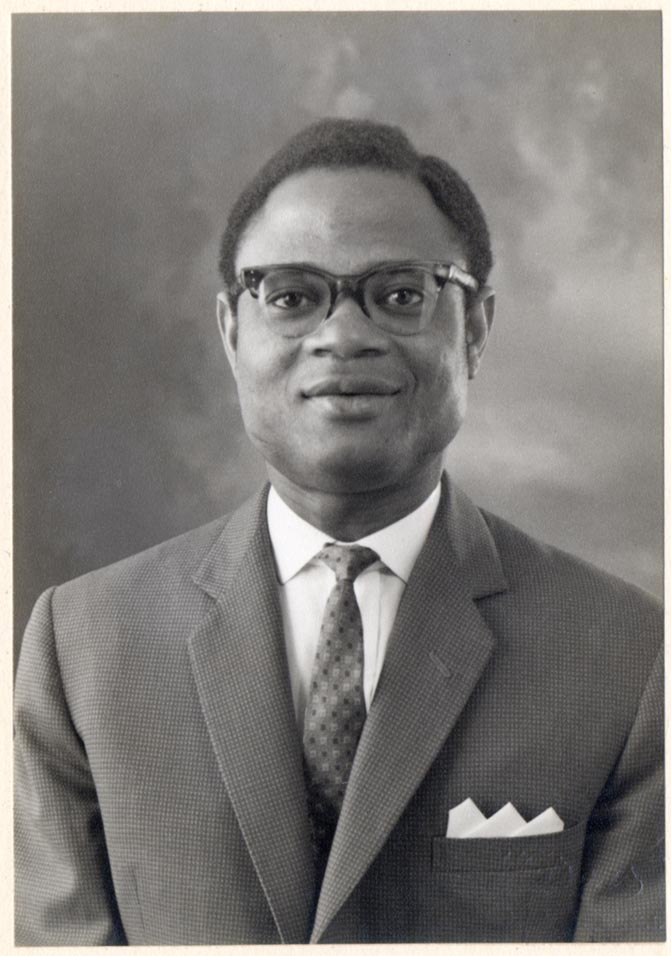
Why did you choose to come to Germany?
After I finished my High School Certificate in Dundee, Scotland, in 1956, I wanted to study medicine, but I didn’t get a place at the university. At that time, because Britain had a lot of colonies, there was an admission quota for each colony at the universities and especially for courses like medicine. Hence, competition for admission was very tough. Because of that I wanted to go to the Royal Military Academy Sandhurst in Surrey, where all officers in the British Army were trained, to become a military officer.
So, I went to my guardian, Dr Teslim Elias, to inform him of my decision. He objected to it and advised that I study law. But I didn’t like law and I told him so. For the next two years, I practically was doing nothing until a friend of mine suggested that we should go to the continent, that is, mainland Europe. We just looked at the map and chose Germany.
So, I went to the library to find out about the universities in Germany. I then wrote to Hamburg, Berlin, Cologne and two or three other universities. I got admission to all of them. I then looked at the map to see which of the universities was closest to England and that was Cologne. So that’s how I went to Cologne.
Were there many Africans in Germany then?
No, not many. There were about 30 Africans when I first arrived Cologne – Nigerians, Ghanaians, some Congolese and others.
How was life then?
The main problem was the language. I came with the friend from England, a fellow Nigerian, and we started studying medicine at the university, but it was very difficult because we didn’t speak a word of German. So, in January 1959, I went to the Goethe Institut in Gothenburg for 8 weeks to learn German. My friend returned to Glasgow in 1959 after only one year in Cologne as he was able to secure admission in a university in the UK.
I then returned to the university in Cologne. I successfully went through the first two semesters. It was not a problem. However, I failed the Physikum, the exam you take after 5 semesters, twice. This was because I still had problems with the language.
In courses like chemistry, physics and botany, you could still manage because the names, formulas and the units are international. However, in physiology, if you’re not very good in German you can’t do well in it. That’s why I failed the exam twice. This meant I had to withdraw from the university.
It must have been a very difficult time.
Yes, I roamed about for some time. Although I enrolled for economics at the university, I didn’t attend classes. I didn’t want to study economics but I had to be enrolled in a university to be able to stay in the country. At that time, if as a foreign student you dropped out of the university, you had to leave the country.
I wrote to my parents and explained the situation to them since they sent me here to study medicine. They were not happy because they were sending me money to study medicine so that I could come back home as a medical doctor. They asked me not to disgrace the family and ensure that I find another university where I could study medicine. Otherwise, they would not send me money again.
Fortunately, I met a Congolese man here in Cologne who told me that there were opportunities for studying in East Germany. You know, at that time, the government of East Germany was giving scholarship to students from Africa. He told me he could help me because he had some influence in East Germany. So, in 1964, he took me to East Germany. We first went to Leipzig from where I was sent to Rostock where I studied medicine. I finished my studies in 1969 after 5 years.
The Berlin Wall had been built at that time. Didn’t you have problems going from East to West and back?
No. During the holidays, I was coming to the West to visit my wife and children. As a foreigner, there was no problem to travel between the two countries. But you had to register with the police to get a visa for re-entry before travelling out.
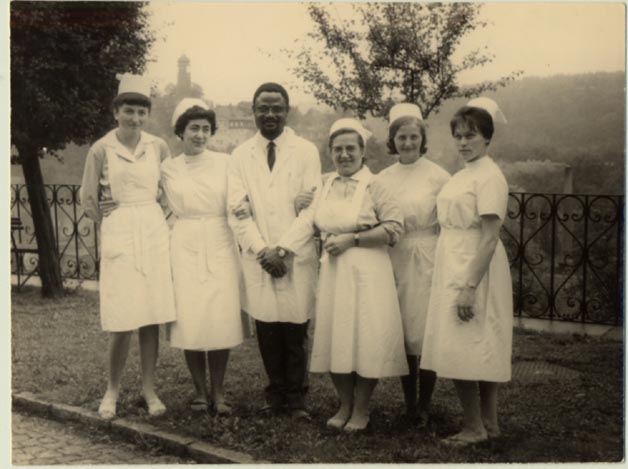
How was your time in East Germany?
It was nice. The government made sure that foreigners living in the country were treated well. For example, at the university canteen, the food we foreign students were served was better than what was served to their own people.
This was propaganda to make sure that when the students go back to their home countries, they would only speak well of East Germany. But that policy created animosity in East Germany towards foreigners. Perhaps that explains the anti-foreigner sentiments there after the fall of the Wall.
What was it like to secure a job after graduation?
At that time, my first wife was working as a sports teacher in a Gymnasium (secondary school) in Koblenz, West Germany. So, she had told some of her colleagues and pupils that her husband was coming back and would be looking for a job. The father of one of her pupils took me in as a doctor in a surgery in a small town near Koblenz. I worked there for one year.
After a year, I moved to the Pathology Department of a big hospital in Koblenz. The head of the department was a Professor Luetrach. He was like a father to me. He was a very nice man. He asked me if I wanted to do my doctorate in Pathology. He gave me a doctorate thesis to write. He sent me to Bonn since he was formerly a professor in Bonn. He told me that it’s important to have a doctorate because a time could come when there would be so many doctors in Germany that hospitals would start looking for those with doctorates. That was how I did my doctorate in Pathology.
After that I left Koblenz, I went to a hospital in Kirchellen, near Bottrop. I worked there for three years. I was very lucky.
When did you first travel back home? It seems that until now you’ve not returned home.
In 1971, I travelled to Nigeria, for the first time since I left in 1954. I took my daughter Modupe with me. My parents told me they would like me to come back home to settle down. And I agreed with them.
What was your impression of Nigeria when you got home? After all, you had not been there for 17 years.
I was shocked. Things were totally different from the way I left them. I spent only 18 days at home. Then we came back to Germany. But then my wife wanted us to go and live in Nigeria.
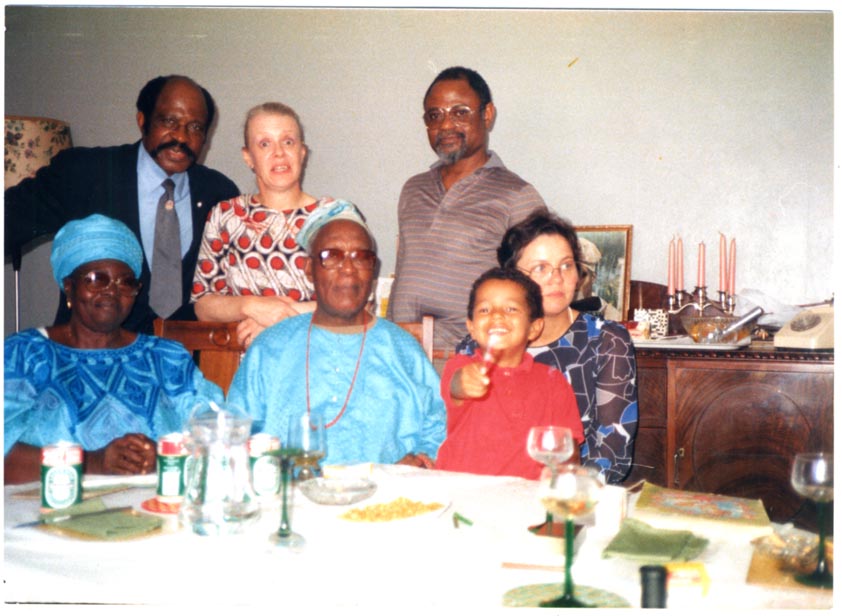
Why did your wife, a German, want you to go back to Nigeria?
Anne was fantastic, she was adventurous. She was curious and was really anxious to experience life in Nigeria. I told her that I didn’t know how life in Nigeria would be. So, I got an undertaking from the state government of North Rhine-Westphalia that I could come back to the country.
Why did you need the paper?
At that time, if you were married to a German, you had to renew your residence permit every year. So if you leave the country, it was not automatic that you could return. It was the SPD-led federal government under Willy Brandt that changed the law to the effect that foreigners married to Germans are permitted to stay indefinitely. The SPD did a lot for foreigners in Germany.
How was the journey back home with your family?
My wife and children went to Hamburg and they took a ship to Nigeria.
Why travel by sea? Couldn’t they have travelled by air?
Yes, but we had a lot of things that we were taking to Nigeria. So it was better to travel with ship. They spent three weeks at sea. I left two weeks later by air to wait for them in Lagos.
How was living at home after such a long time away?
I got a job at the state hospital in Lagos. But I had problems because you couldn’t work the way you worked in Germany. When you’re supposed to start work at 8 am, most people came in at 10 am! When you complained, they said that’s how it’s done here.
Then, I was paid only 250 naira, at that time about 1,000 deutsche marks, per month. But the money was not enough; it couldn’t even pay the rent in a decent part of Lagos. You know Lagos is a very expensive city. However, I was lucky because a rich uncle of mine, who had died, left behind a big house in Ikeja GRA (a highbrow area of Lagos) and his young wife could not live alone in the house. She invited me and my family to live with her.
All my colleagues would wonder how I could afford to live in such an expensive place. At that time, more than 70 per cent of those living in Ikeja GRA were Europeans. There were also some Germans among them.
I knew that I couldn’t live in the big house forever. And I had to pay 700 naira per term for my children in the private German school that they were attending. Although my mother helped us financially, I was no longer comfortable with life at home. After fifteen months, I decided that we had to return to Germany. And the first task was to convince my wife.
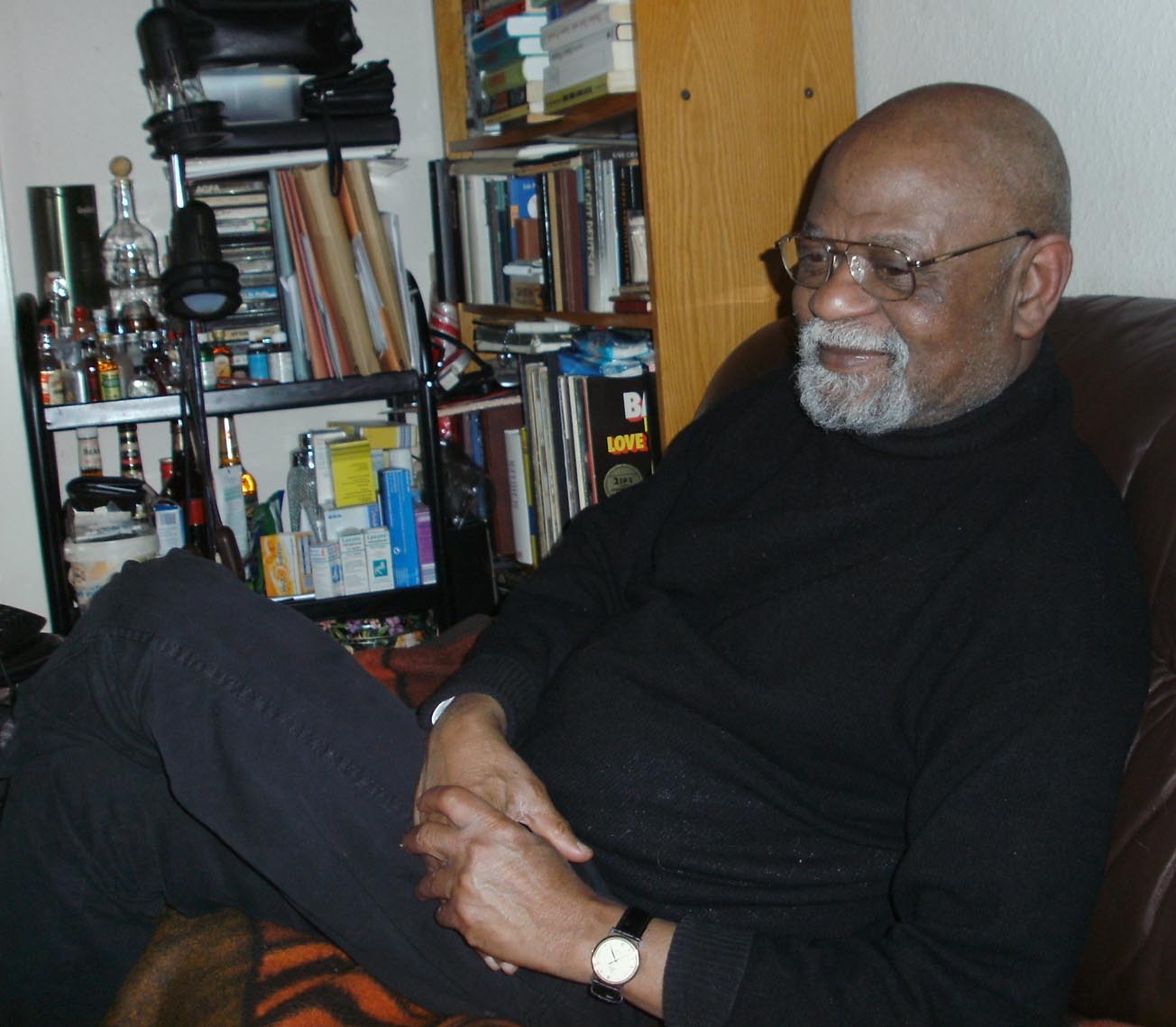
Didn’t she want to go back to Germany?
No, she loved Nigeria so much. It’s a different Nigeria; not the one of today.
Life was good for her, too.
Although Nigeria was good at that time, why did you leave?
I couldn’t afford to live the kind of life I loved to live there. They didn’t have good teachers in the public schools; I paid 700 naira for my kids in the private school. I was able to manage for sometime because we doctors were doing illegal things to earn extra money. For example, by giving sick leave to people who were not sick but were ready to pay. But I wasn’t comfortable doing things like that.
Did you have to apply for a re-entry visa to Germany?
Yes. My wife took the paper I was given before leaving Germany to the German embassy in Lagos to inform them that I wanted to return. They said I would be given a visa if I had a job.
So, I wrote to the last place where I had worked, the hospital in Kirchellen, which sent me a telegram that I could come back and resume work immediately. That’s how I came back to Germany.
Wasn’t it difficult readjusting to life in Germany again?
When we returned, my wife was no longer happy. We later had differences in the marriage which made us decide to divorce. Our two children suffered because of the situation. I was not happy because I wanted my children to have a good upbringing. I had to pay so much. It later became too much for me and after some years, I felt like returning home again. Meanwhile, I had met and married my second wife, Ursula.
Did you attempt to return home again?
Yes. In 1983, I went to Nigeria for two months to look for a job and I got one at the Ministry of Health in Ogun State. But they told me to go back to Germany so that they could check the genuineness of my certificates after which they would send me an employment letter.
I therefore waited and waited for the letter which didn’t come for a long time. When the letter from Nigeria finally did arrive, I went to my boss and said that I wanted to go to Nigeria. He asked why I wanted to go back because the military was now ruling the country with all the problems. I therefore decided to stay. In 1990, I was offered the position of an Oberarzt (Senior Physician) in a hospital in Winterkasten, where I worked until my retirement.
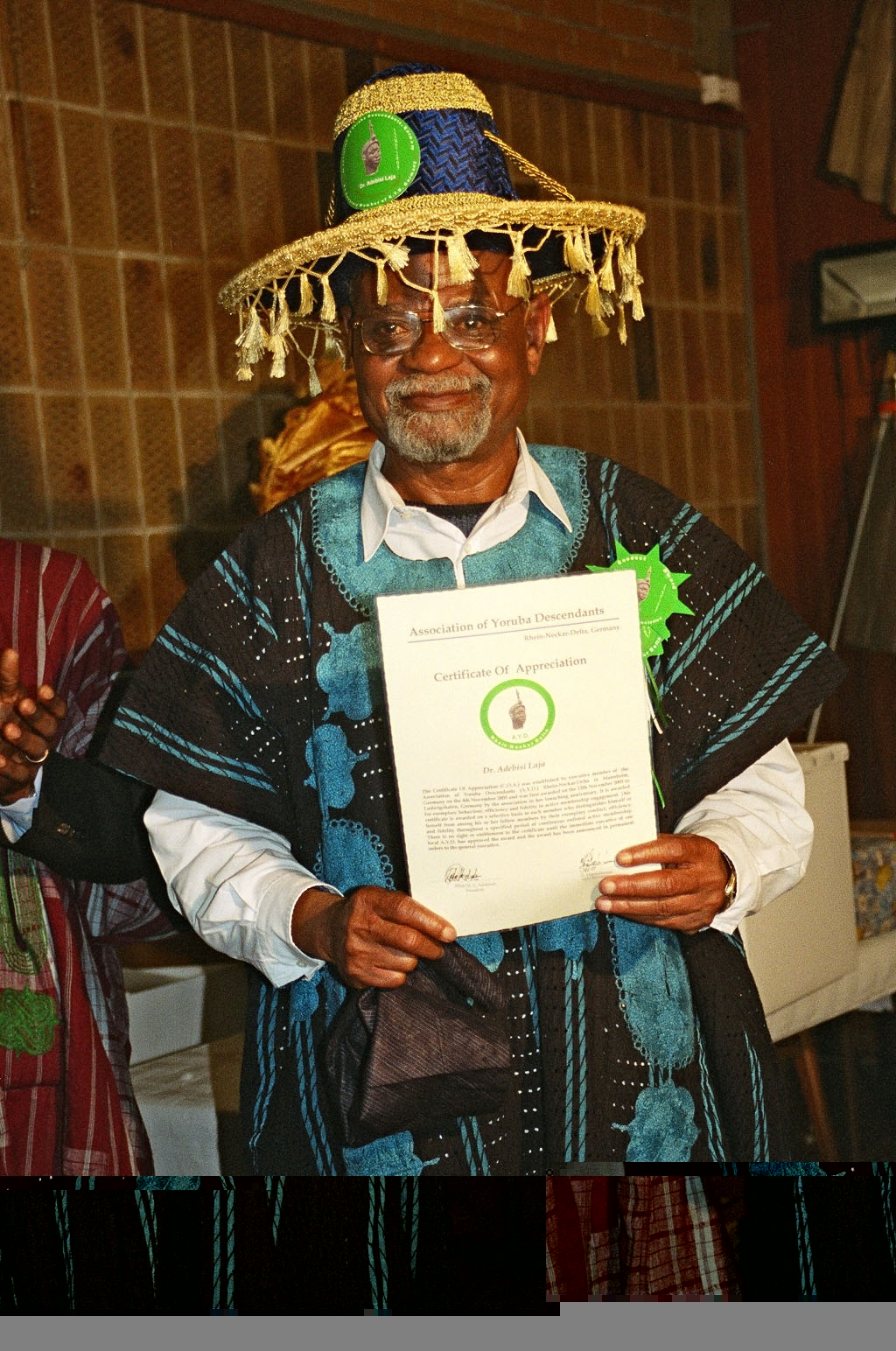
What changes have you noticed in Germany since you came to the country in 1958?
When I started studying in Cologne, advertisements for room vacancies at the AStA (student advisory office) carried remarks such as KA (Keine Auslaender) and KN (Keine Neger). Once, I was looking for a room and the landlord forgot to indicate that. So I went with a German friend of mine. When he saw us and realised that I was the one looking for a room, he said: “I don’t want that one,” rudely pointing to me. I was mad, confused and asked myself “Am I not a human being?”
Did you have problems with your doctor colleagues in the places that you worked?
At all the places where I worked, I got on well with patients and colleagues. Except a case of a doctor who said he didn’t want to work under me when I was made an Oberarzt (Senior Physician) in Winterkasten. In fact, patients preferred to go to a foreign doctor because they know you will keep their secret since you’re not from the community.
I also have a thick skin. If you said anything to me which I didn’t like, I allow it to pass out of my second ear. I didn’t dwell much on it.
Why?
That is the way I’m simply made. And when I faced rejection anywhere I always tended not to link the reason for the rejection to my colour. That attitude helped me a lot. In the past, many Africans turned crazy because of racism and even had to be sent to psychiatric homes or back to their countries. This was not only in Germany, but also in England.
Most Africans in the Diaspora dream of spending their retirement in their home countries. But you have chosen to stay in Germany. Why?
I’m so used to living in Europe that it has become home for me. If you leave your home country for a long period of time and you go back, you’ll not find the place the same because you’re no longer the same person yourself.
Anytime I go to Nigeria – I do that every two years, after a few days there with no electricity and the traffic jam, I feel like going back to Germany. That is the human experience.
There are also Europeans who live in Africa and don’t want to come back to Europe. I know a Swiss woman who is rich and lives in Lagos. In fact, she even has to take money from her assets in Switzerland to pay the staff of the travel agency she runs in Nigeria. I asked her once Why do you do this to yourself? Why don’t you go back to Switzerland? And she replied: “Dr Laja, I can no longer live in Europe.”
What is your advice to Africans in Europe?
If you’re working here, the pension scheme is very important. A majority of our people don’t take the pension seriously enough. But pension is very important so that you can live with dignity in old age.
Another important thing: there are always opportunities to make it despite unemployment in the country. Young people must strive hard to make something out of their lives. This is very important. It doesn’t help complaining all the time about problems.
I have a friend who has been living here for more than thirty years but he keeps complaining all the time that I once asked why he hasn’t left Germany. I think it’s important to have a positive attitude towards the society for your own sake.
If you look back at your life, what verdict would you give?
I’ve enjoyed everything. I have no regrets. If I were to be born again, I would do it the same way again.
**The interview was conducted by Femi Awoniyi and first published in The African Courier magazine in 2012. Dr Adebisi Laja died peacefully at his home in the western German town of Lindenfels on 12 December 2016.
 THE AFRICAN COURIER. Reporting Africa and its Diaspora! The African Courier is an international magazine published in Germany to report on Africa and the Diaspora African experience. The first issue of the bimonthly magazine appeared on the newsstands on 15 February 1998. The African Courier is a communication forum for European-African political, economic and cultural exchanges, and a voice for Africa in Europe.
THE AFRICAN COURIER. Reporting Africa and its Diaspora! The African Courier is an international magazine published in Germany to report on Africa and the Diaspora African experience. The first issue of the bimonthly magazine appeared on the newsstands on 15 February 1998. The African Courier is a communication forum for European-African political, economic and cultural exchanges, and a voice for Africa in Europe.

